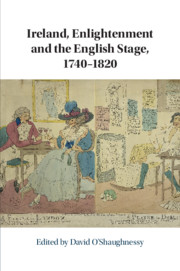Book contents
- Ireland, Enlightenment and the English Stage, 1740–1820
- Ireland, Enlightenment and the English Stage, 1740–1820
- Copyright page
- Contents
- Illustrations
- Tables
- Contributors
- Acknowledgements
- Introduction Staging an Irish Enlightenment
- Part I Representations and Resistance
- Chapter 1 Straddling: London-Irish Actresses in Performance
- Chapter 2 John Johnstone and the Possibilities of Irishness, 1783–1820
- Chapter 3 The Diminution of ‘Irish’ Johnstone
- Part II Symbiotic Stages: Dublin and London
- Part III Enlightened Perspectives
- Select Bibliography
- Index
Chapter 3 - The Diminution of ‘Irish’ Johnstone
from Part I - Representations and Resistance
Published online by Cambridge University Press: 22 July 2019
- Ireland, Enlightenment and the English Stage, 1740–1820
- Ireland, Enlightenment and the English Stage, 1740–1820
- Copyright page
- Contents
- Illustrations
- Tables
- Contributors
- Acknowledgements
- Introduction Staging an Irish Enlightenment
- Part I Representations and Resistance
- Chapter 1 Straddling: London-Irish Actresses in Performance
- Chapter 2 John Johnstone and the Possibilities of Irishness, 1783–1820
- Chapter 3 The Diminution of ‘Irish’ Johnstone
- Part II Symbiotic Stages: Dublin and London
- Part III Enlightened Perspectives
- Select Bibliography
- Index
Summary
John Henry Johnstone (1749–1828), sometime cavalryman, promiscuous lover and Dublin tenor, spent the best part of forty years on the legitimate London stage, playing everything from Lucy in a cross-cast Beggars’ Opera to both ‘genuine’ and comic Stage Irish roles. Though deemed ‘most unmusical’ by Haydn, his greatest cultural influence was as a singer, particularly of ‘Irish’ songs. This chapter examines the figure of Johnstone as a cross-media production of Irishness, focusing upon these songs and their dissemination.
Cox Jensen’s essay is a rejoinder to Davis’s positive reading of Johnstone’s career and contends that the gradual fixing of this identity largely represented a diminution of Johnstone, subsumed within a role determined beyond the sphere of his own agency. Linking the growing consensus that Johnstone was the Stage Irishman to factors ranging from vocal technique to an association with the ‘poor Irish’ of London’s Seven Dials, Cox Jensen nuances recent accounts of the positive appropriation of Irishness, exploring the intermedial means by which the English cultural economy muffled and managed this most sonorous of Irish voices. Read in tandem with Davis’s piece, the essay gestures towards the spectrum of interpretative positions available when considering the resilience and authority of theatrical stereotypes.
- Type
- Chapter
- Information
- Ireland, Enlightenment and the English Stage, 1740-1820 , pp. 79 - 98Publisher: Cambridge University PressPrint publication year: 2019



